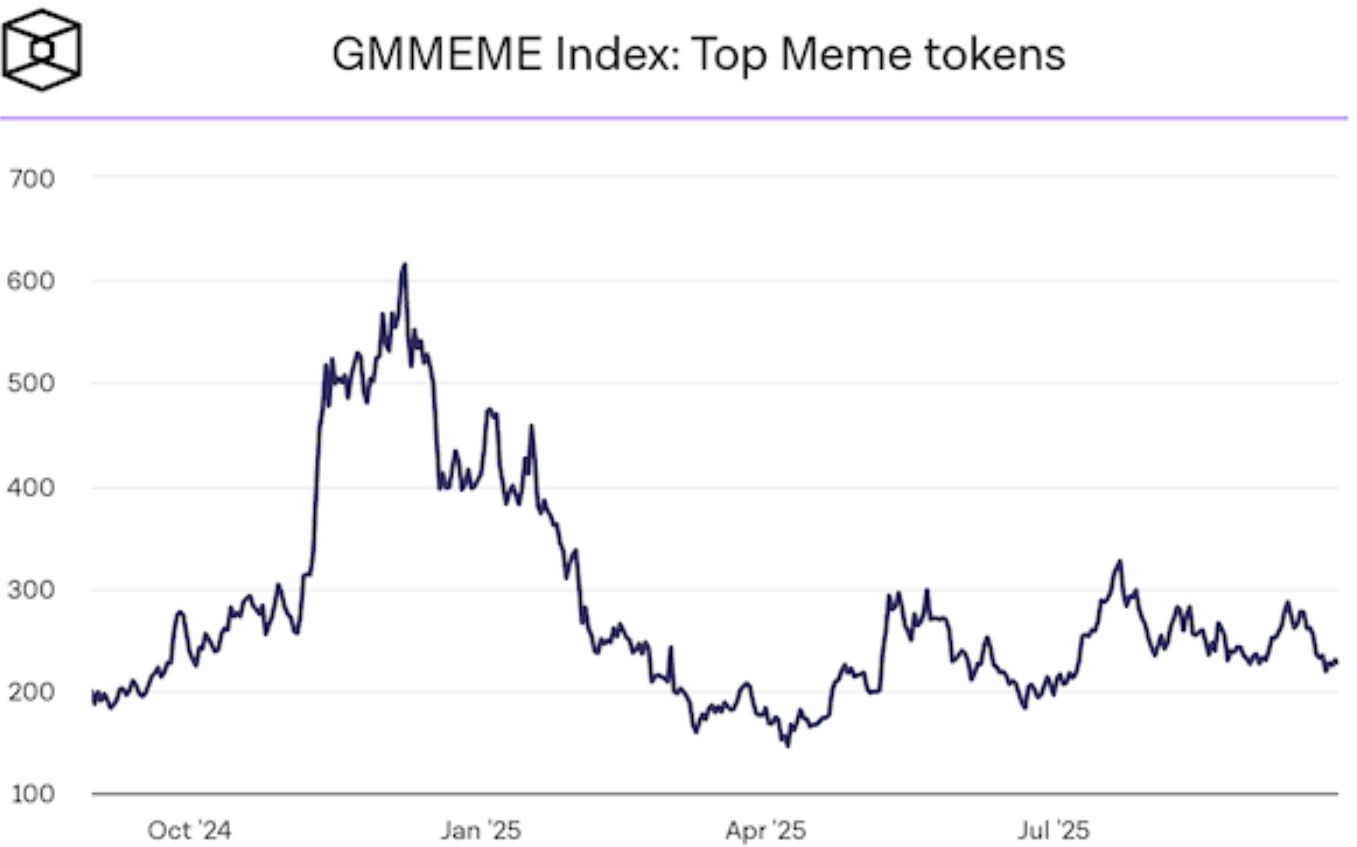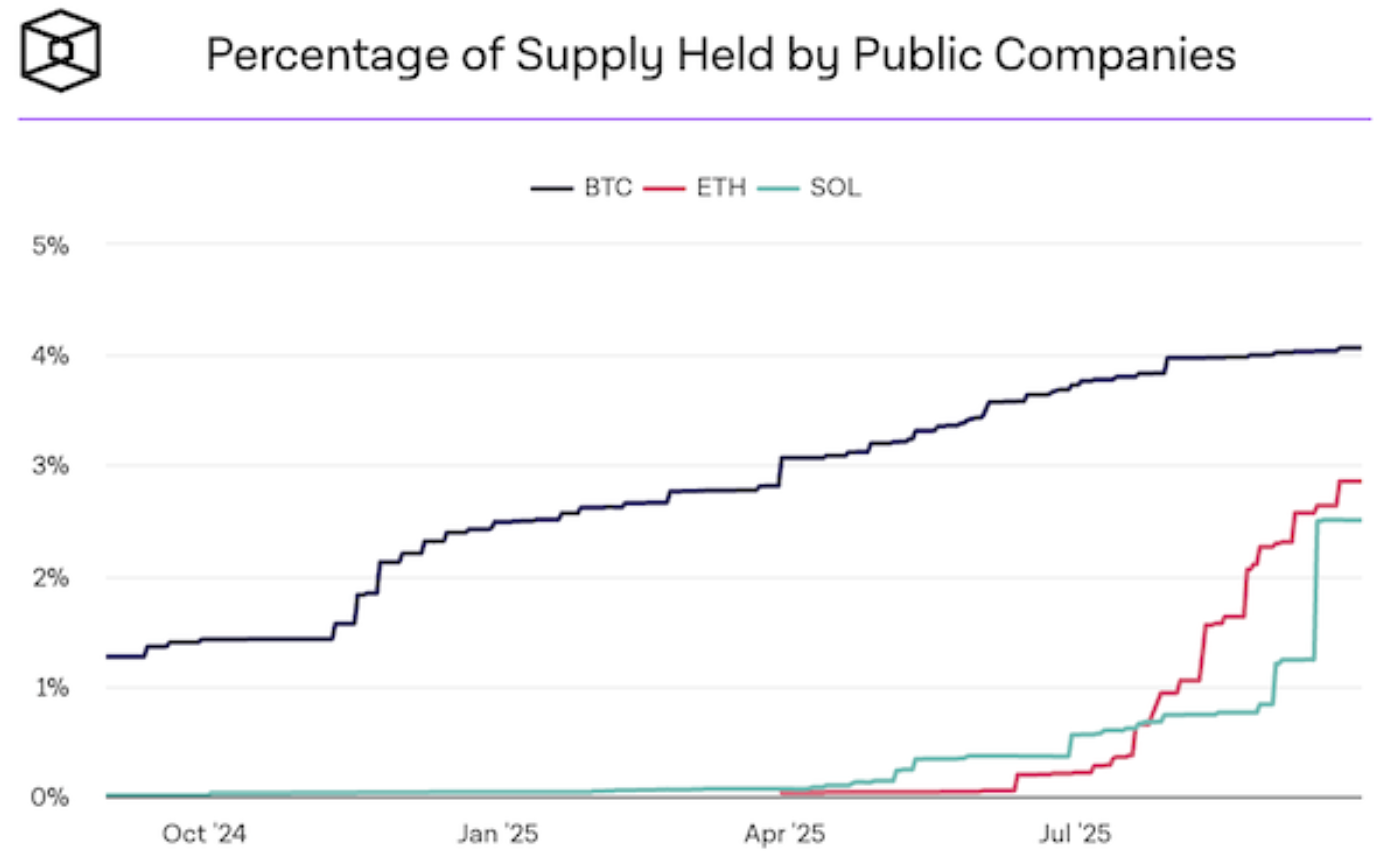Top Stories
Memecoin Market Stalls as Investors Shift Toward Utility Tokens
The GMCI memecoin index has hovered around 220—far below its 2024 peak of 600—highlighting waning enthusiasm for speculative tokens like Fartcoin, Bonk, and WIF. Even major names such as Dogecoin, Pepe, and Shiba Inu have failed to regain traction, diverging sharply from top altcoin indexes that have hit new highs. Traders are increasingly favoring projects with tangible utility, as seen with strong receptions for ASTER and XPL, signaling a broader shift toward tokens tied to revenue generation, stablecoins, DeFi, and real-world asset initiatives. Memecoins, once the entry point for retail investors, are losing ground to projects offering clearer value propositions.

Source: GMCI
Samsung Expands Coinbase Integration for Galaxy Users
Samsung is deepening its partnership with Coinbase to enable U.S. Galaxy smartphone users to buy crypto directly through Samsung Wallet. The integration links Samsung Pay with Coinbase and targets more than 75 million Galaxy users, with a global rollout planned soon. Users will also receive limited-time access to Coinbase One’s Preferred Tier, offering waived fees and enhanced staking rewards. The move brings crypto into Samsung Wallet’s broader suite of payments, IDs, and memberships, while giving Coinbase a valuable retail distribution boost against competitors like Kraken and Robinhood.
From Memecoins to Markets: The Evolution of On-Chain Speculation
After peaking between Q4 2024 and Q1 2025 with $20B in weekly meme DEX volume on Solana, memecoin trading has cooled by 75% to around $5B per week. While meme launchpads still generate over $700M in annualized revenue, traders are shifting toward new speculative frontiers like on-chain trading card games and SocialFi. Collector Crypt’s NFT-based Pokémon card “Gacha” packs have driven over $200M in market activity, combining digital speculation with redeemable real-world value. Simultaneously, creator coin platforms such as Zora have exploded—up 3x month-over-month to 250K monthly launches—while prediction markets like Kalshi have surged to $500M in weekly volume and $190M in open interest. The rise of AI-assisted tools like Bracky and Pricediction suggests the next phase of speculation will blend crowd prediction, automation, and incentive-driven accuracy—turning meme-fueled capital flows into more persistent, data-informed markets.

Source: Dune
Capital Moves Up the Onchain Yield Curve
Institutional capital is flowing further up the onchain yield curve as tokenized credit and equity products gain traction. Grove deployed $50M into Anemoy’s Tokenized Apollo Diversified Credit Fund (ACRDX) on Plume × Centrifuge, marking a major launch-scale move into onchain credit. Maple surpassed $4B AUM, led by syrupUSDC at $2.6B (with $1.2B in loans) and syrupUSDT at $636M after its $200M Plasma vault filled instantly. In tokenized equities, Ondo Global Markets now exceeds $300M TVL, with ETFs comprising 61%, while Galaxy’s Solana-based GLXY token tripled its holder base and Centrifuge introduced SPXA—the first licensed S&P 500 index fund token on Base, set to expand to Wormhole next.

Source: Dune
Regulation
Chasing DAT Crypto
Digital Asset Treasury (DAT) firms are rapidly multiplying as public companies broaden holdings beyond Bitcoin’s 4.1% share to include Ethereum (2.9%) and Solana (2.6%), signaling growing institutional diversification into alternative assets. NASDAQ-listed firms often rebrand as crypto treasuries after major raises, using in-kind token contributions to amass holdings while giving investors equity-based exposure. These conversions have boosted stock valuations, creating a feedback loop attracting more entrants. However, DATs tied to smaller altcoins raise concerns, as foundation teams may exploit them for early liquidity by exchanging unvested tokens for shares. While DATs can deepen institutional access to crypto, their long-term credibility depends on sustained commitment to token holdings rather than serving as exit vehicles for insiders.

Source: The Block, Coindesk
Swift to Integrate Blockchain Ledger for Real-Time Cross-Border Payments
Swift will incorporate a blockchain-based shared ledger into its global payments infrastructure, beginning with real-time, 24/7 cross-border transactions. The system—co-developed with Consensys, the firm behind MetaMask and Ethereum Layer 2 Linea—uses smart contracts to verify tokenized value transfers and will be tested by over 30 global banks, including Bank of America, HSBC, and BNP Paribas. Swift frames the move as part of its strategy to build interoperable, onchain financial infrastructure while maintaining compliance standards.
Visa Pilots Stablecoin Funding for Faster Cross-Border Payments
Visa has begun piloting stablecoin funding for Visa Direct, allowing banks and remittance providers to send cross-border payments in minutes instead of days. The program uses Circle’s USDC and EURC as the first test assets, treating them as “money in the bank” for instant liquidity and faster payouts. Businesses can pre-fund in stablecoins while recipients still receive local currency, reducing the need to lock up cash in advance. While Visa hasn’t ruled out launching its own stablecoin, the company said its current focus is scaling real-world use of existing assets through card, settlement, and banking integrations.
UK Debates Keeping $7B in Seized Bitcoin as Strategic Reserve
The UK government is V it seized in 2018 following a major Chinese investment fraud, sparking debate over whether it should form the basis of a national Bitcoin reserve. While some in the crypto industry urge the government to hold the assets as a long-term strategic reserve to signal support for the sector, legal experts argue that doing so would contradict the Proceeds of Crime Act, which mandates recovered assets be liquidated for victim compensation. British Blockchain Association President Naseem Naqvi warned that holding volatile assets would breach Treasury and Bank of England reserve principles, though he acknowledged the symbolic value such a move would carry. CryptoUK and other trade bodies advocate for feasibility studies or pilot allocations, noting that countries like Sweden are already exploring national Bitcoin reserves. Treasury officials, however, maintain that adding crypto to official reserves “is not the plan,” and any retained BTC would likely be sold gradually to minimize market disruption.
Other Domestic Regulation Updates
- Bloomberg analyst puts odds of Litecoin, Solana and XRP ETF approvals at 100%
- Tokenization framework in most major markets by 2030, Robinhood CEO predicts
- Crypto needs non-USD stablecoins for meaningful utility, Jesse Pollak says
- Stablecoin market cap surpasses $300 billion
- White House Pulls Quintenz CFTC Chair Nomination After Clash With Winklevoss Twins
- Lost Texts Spur Oversight Inquiry Into Former SEC Chair Gary Gensler
- Bored Ape NFTs Are Not Securities, Court Rules in Landmark Decision
- Coinbase Applies for US Banking License, Joining Growing Pack of Crypto Firms
Other International Regulation Updates
- Ripple's David Schwartz announces exit
- World Liberty Financial plans to tokenize RWAs
- Metaplanet now fourth-largest public bitcoin holder after latest $620 million buy
Pain & Gain
Pain
- Tennessee Couple Hit With $6.8 Million Penalty for 'Blessings of God Thru Crypto' Fraud
- SEC Halts Trading of Bitcoin, Ethereum Treasury Firm QMMM After 2,000% Stock Surge
- Suspected Crypto Scammer Linked to $580 Million in Stolen Funds Arrested in Bangkok
Gain
- Dormant bitcoin whale wakes up after 12-year slumber to 830x gains
- Andre Cronje's Flying Tulip raises $200 million at $1 billion token valuation
- Kalshi will be on 'every major crypto app' in next 12 months, says John Wang
- Stablecoin market cap surpasses $300 billion for first time amid crypto rebound
Important Legal Notices
This reflects the views MJL Capital LLC (“MJL”), but it should in no way be construed to represent financial or investment advice. Nothing in this correspondence is intended to constitute or form part of, and should not be construed as, an issue for sale or subscription of, or solicitation of any offer or invitation to subscribe for, underwrite, or otherwise acquire or dispose of any security, including any interest in any private investment fund managed by MJL. Any such offer may only be made pursuant to a formal confidential private placement memorandum of any such fund, which may be furnished to potential investors upon request and which will contain important information to be considered in connection with any such investment, including risk factors associated with making any investment in any such fund. Further, nothing in this correspondence is, or is intended to be treated as, investment or tax advice. Each recipient should consult their own legal, tax and other professional advisors in connection with investment decisions.
Domenic Salvo is a Managing Partner at MJL Capital, helping lead Portfolio Research and Investor Relations.




